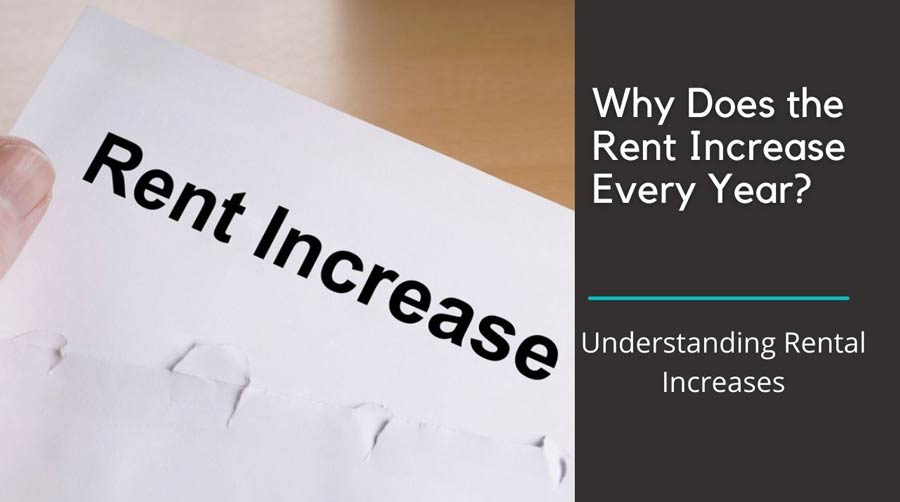
Why Does the Rent Increase Every Year?
Getting a notice from your landlord that your rent is increasing would ruin anyone’s day. Unfortunately, this stress-inducing reality has been happening across the country as reports of rental rates hitting an all-time high have been making headlines regularly.
After the initial shocks wear off (and the superlatives subside), it’s time to start thinking about your options for dealing with a rent increase. Keep reading to find out what you can do when your landlord raises the rent.
First Things First: It's Important to Understand Why Your Rent Is Going Up
Like most industries, the rental market responds to economic trends creating conditions for owners to ask for rent depending on their region. Landlords may decide to increase their rental prices to match market rates, pay for property maintenance or improvements, accommodate tax increases, or simply increase their profits a bit. Keep in mind in past years. Landlords had to lower rents due to an oversupply of rental properties, so it goes both ways.
How Much Can Rent Increase?
It turns out that most landlords do not regularly raise their rent to match the cost of owning and maintaining a property. What ends up happening is after five years at a steady rental rate, the owner will realize that a rent increase is necessary to keep up with increasing property taxes, maintenance, insurance, and market rates. Suddenly, after five years of affordable rent, you might see a sudden 10-25% increase.
For many renters, a 25% increase could price them out of their current rental property. It is recommended that landlords include a regular 3-6% increase every year, so they do not find themselves in a situation where they are suddenly asking their residents/tenants to pay an extra few hundred dollars a month. A $75 increase each year is a lot easier to stomach than a $400 increase after nothing for five years.
In California, rental increases are regulated by the city or area that the rental property is located. For example, in Riverside and Orange County, a landlord can increase the rent by 8.6% annually (as of August 1st, 2021) if an LLC or Corporation holds the property. If a sole owner holds the property, the increase could be as much as 10% of the current rental rate.
If You're Facing a Rent Increase, Here's What You Should Do:
1. Ask for time to think about it.
You don’t need to decide today if you are staying or going. But you do need to plan to think about your finances. Housing expenses should account for 30% of your income (including utilities). If the new rent is going to price you out of your household budget, finding a less expensive rental is what needs to happen. Do not put additional strain on your finances by living in a place you cannot afford.
If you can afford the new rent but do not want to pay it, do some research to see what else is on the market. You might discover that rents have gone up universally when you check Zillow in your area, and your landlord is asking for a reasonable price. Would it be worth the moving expenses to find a comparable property with comparable rent?
2. Try to negotiate reaonsably
Have a professional and honest conversation with your landlord before you start paying the higher rate or perusing the rental ads. Tell your landlord you are concerned with the rising rent prices and probably have to move. You might find that he likes you as a resident/tenant and will negotiate the rent increase down to keep you. This tactic will only work if you get along with your landlord and have a history of on-time rent payments.
You have to be prepared for him to say no. But it won’t hurt anything to ask. Be professional, empathic, reasonable, and never get angry or defensive. I have heard the success of renters talking a 10% rent increase down to 5-7%, with the knowledge that the rent will increase by another 5% in a year, but at least it wasn’t such a steep jump. If you are mean or hostile during this conversation, your landlord will probably be happy that you are moving out.
3. Ask to sign a longer, fixed-term lease
Landlords cannot raise the rent on you during a fixed-term lease agreement. If you are tired of your landlord raising the rent every year, ask your landlord if you can sign a lease for 1 or 2 years. This means you will have to commit to living on that property, but if you have no intention of moving, you will benefit from knowing that your housing budget will remain stable.
In most cases, your landlord will agree to an extended lease agreement because that means they will not have to deal with releasing the property, turnover, or vacancy. If you already have a history of on-time rent payments and a good landlord-resident/tenant relationship, your landlord should be open to a long-term lease agreement.
4. Move Out
In some cases, the only thing to do will be to move. The harsh reality of rising rents is that some people will be forced to move out of great homes in prime locations. Moving away from your city center or job can reduce your housing expenses; however, it may also make your commuting expenses go up.
If you live in a tight rental market with limited vacancies, be sure to communicate your moving plans to your landlord. He might be reasonable about giving you an extension to live on the property at your current rate until you find a new property. Don’t overstay your welcome or take advantage of your landlord’s generosity. Remember that your current landlord will need to give you a reference to find a new place.











